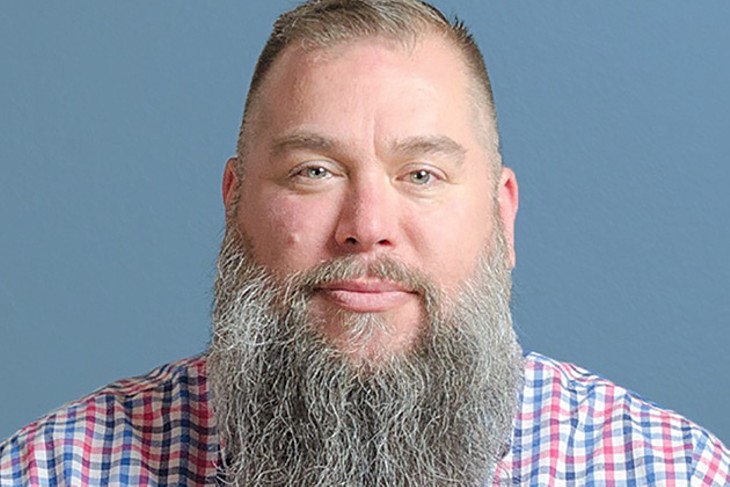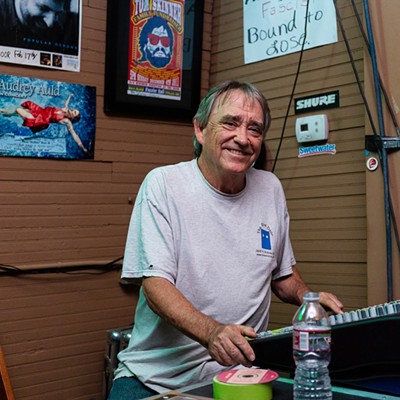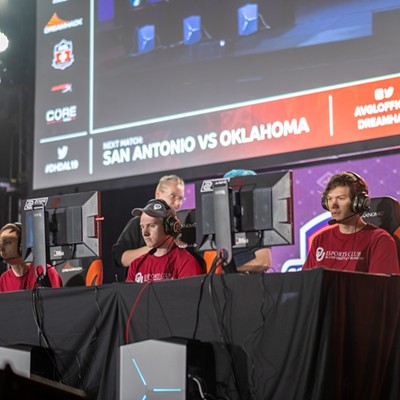Oklahoma City is a “great ecosystem” for software developers, said Clevyr’s Matt Williamson.
“I’ve been doing this myself in Oklahoma City since 1995, so I’ve been around and seen a lot. And I would say that the culture in Oklahoma City now is just phenomenal for developers,” Williamson said. “Almost every day, you can go to a meetup, grab lunch, meet other developers and talk about a specific platform or project or style. … We do a lot of that. We really encourage our developers to go out into the public and meet other developers and meet other people like that. It’s good for us, and it’s good for the environment.”
Collaboration is huge in the technology sector. Not only are developers encouraged to work with others outside their company, Williamson said the natural workflow within the company is also built on teamwork.
“At Clevyr right now, there’s about 18 developers. For the most part, they work in a large, shared room, and it is just almost continual discourse about ‘how to do this,’ ‘why’d you do that,’ ‘check this out,’” he said. “There are plenty of times when it’s super quiet and all you hear is the clicking of keyboards and everyone’s got headphones on and heads down banging things out, but then out of nowhere, someone pulls off a headphone and says, ‘Anyone else seeing this?’ And then that sparks conversation, and that kind of stuff is great.”
Dev operations
After working with a financial tech company that laid off most of its developers, Williamson founded Clevyr in 2009 so nobody could lay him off again. The custom software development company does mobile and web applications, games, artificial intelligence and machine learning work for a myriad of clients.Clevyr has grown organically in OKC partly for the same reason the city is a great software development ecosystem: it’s a big city that acts like a small town.
“We started and it was me and some partners. There were three of us for a long time. We’re up to a little over 30 now,” he said. “At the end of the day, if you have acted with integrity and you gave your client the best that you can possibly do, then you’re going to do great. That makes clients want to share you and clients want to tell other people about you. That’s the whole thing about Oklahoma people, you have to be able to trust them. … After you and I see each other, we shake hands and we talk about whatever we’re going to talk about, I’m going to run into you somewhere. I have to know that I’ve done the best job I can for you. Otherwise, I’ve got some guy out there who doesn’t want to hang out with me and work with our company.”
Williamson said his company also does a lot of work upfront with its clients to make sure the product is exactly what they need.
“We do have a great business development staff that really understands the needs of clients when it comes to this type of technology. So we do a really great job of assessing the needs of a client before we get anywhere near writing a contract,” Williamson said. “We do a lot of work with the client to get them ready to understand what it means to be a technology owner, because when someone comes in and asks us to build an application, what they have to understand is, they are becoming a company that is based around technology in large part.”
Paul Stanley, a former sports broadcaster, came up with My Sports Vote, which launched earlier this year and allows fans to vote on different issues surrounding teams across the five main college conference sports and four professional sports – baseball, basketball, football and hockey.
Stanley said they share the results with the teams and leagues, and users can earn different ranks within the app as they vote, predict outcomes and participate in trivia. It took about a year after coming up with the idea to get the app ready to launch.
“The culture in Oklahoma City now is just phenomenal for developers.”
tweet this
—Matthew Williamson
“We had to interview different app companies to see who had the best vision,” he said. “We mainly wanted to go to somebody who had more of a vision and ideas and a passion for this particular project, and that’s how we ended up doing that. ... It has to go to somebody who has experience that seems trustworthy and has passion. Those people are out there. Just finding the right fit is the big challenge.”
Though the app is fairly new, Stanley said its now all about staying on top of their game.
“When you first come out, be prepared for bugs and testing to make sure things get worked out because you don’t know what you don’t know until you go live. We did a soft opening for about a month with different testings to make sure all the bugs were worked out,” he said. “Now we get to compete against the thousands of other app companies out there and try to make ours known. The challenge is, do we do this with a big marketing budget … or do you do a grassroots – which is what we’re doing – which is a very slow process of people seeing value and sharing it with other people.”
My Sports Vote makes revenue on ads, which means it gets more money as it gains more users.
“You need a lot of users ‘til you start making money,” Stanley said. “My initial goal was to try to break even at a year, but we’re probably realistically at a one to two year mark to try to breakeven and start hopefully turning a profit. It’ll take some time for sure.”
Framework
Software development isn’t just Williamson’s career, but it’s also his hobby and passion. This despite the fact that he actually went to school for journalism.
“My circuitous route starts really with my dad, who was a developer in the ’70s. So I grew up hanging out in old-school software places with giant computers with blinking green lights and a wheel that rotates,” he said. “I just always understood technology because I was always around it. I got a degree in journalism because I love to write. Really quickly, I figured out that there was a lot more money to be made in the technology side.”
In a way, Williamson was able to merge both passions and said he became employee No. 1 at NewsOK shortly after graduating. Along with four others, they helped build the platform that powered the NewsOK website.
Many developers have similar stories of going to school for a different degree or plan a specific career but end up getting into software development in some way.
“Right now is the best time on the planet to learn to be a developer because there are so many excellent resources,” he said. “One of my best devs is a teacher by trade. She went to Japan and while she was there teaching English, she decided to teach herself dev. She ends up coming back here, going to some code camps and she’s been writing code for me for a year or two now. … People with a good, solid understanding from a degree can excel probably more quickly, but if you’re inquisitive and you’re intelligent, writing code is just using logic.”
Right now is also a great time for software development, Williamson said, because technology’s future in Oklahoma looks bright.
“Our state has really grasped and embraced the idea that we can be as powerful as a Kansas City or an Austin or Boston,” he said. “The only thing slowing us down right now is really the income of venture capital, but we’re going to see that change too. As we get better and stronger at building these apps and letting people understand what Oklahoma can do, then we’re going to see an influx of that venture capital as well.”












